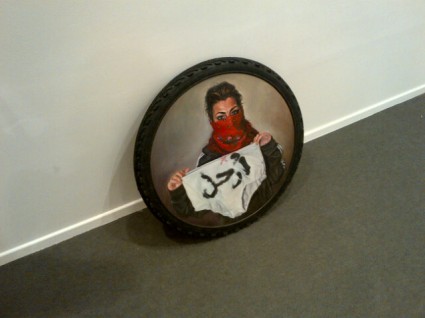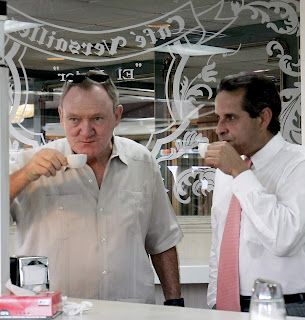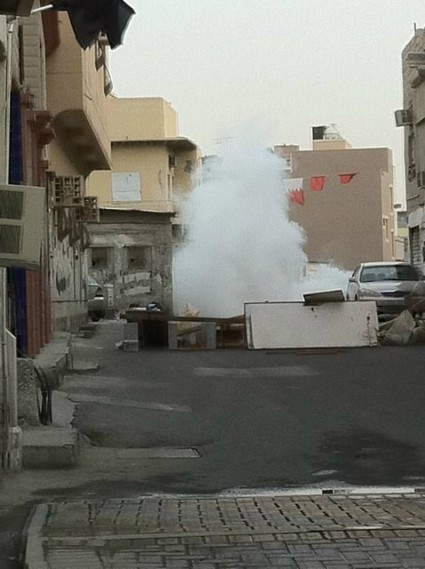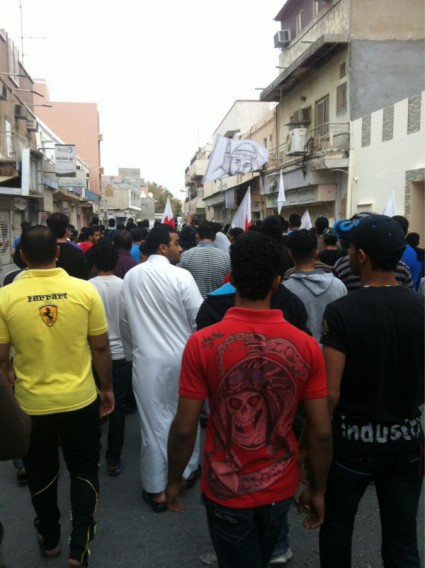Convoy of UK-made Saudi Arabian armoured personnel carriers arrives in Bahrain
March 21, 2012 No Comments
Obama side-steps Congress on Weapons to Bahrain – deal made via NUROL Turkey (US-BAE Subsidary)
editor: The Armored Personnel Carriers or Armored Personnel Vehicles, President Obama said would be used in Bahrain against “External Threats Only” have appeared in Bahrain, purchased from US BAE Subsidiary NUROL in Turkey. They are, even today, being used extensively against Protesters in the Villages of Bahrain. Phlipn
FNSS Defence Systems Co.
Foundation 1988 Phone 0090 312 497 43 00
Employees 610 Fax 0090 312 497 43 01
General Manager & CEO Nail KURT
E-mail info@fnss.com marketing@fnss.com.tr
Address Pk. 37 06830 Gölbaşı
ANKARA – TURKEY
Web www.fnss.com.tr
FNSS Savunma Sistemleri A.Ş. is a joint venture company established by NUROL Holding of Turkey and BAE Systems Land & Armaments L.P. of USA. FNSS is a leading manufacturer and supplier of tracked and wheeled armored combat vehicles and weapon systems for the Turkish Armed Forces and Allied Armed Forces.
The company was established in 1988 to manufacture 1698 Armored Combat Vehicles (ACV’s) for Turkish Armed Forces under a direct commercial contract (1st package ACV) with the Undersecretariat of Defense Industries (SSM). The facilities situated on a total area of 280.000 square meters in Gölbaşı, Ankara started the production in August 1991. The 1st package ACV contract has successfully been completed in 2000.
410 people work at FNSS’s Ankara facilities as of March 2011. Additional 200 are employed in its operations outside Turkey.
FNSS has a full range of Family of Tracked Armored Combat Vehicles (ACV). The ACV is a combat proven medium weight, low silhouette armored vehicle capable of high mobility in all kinds of terrain and amphibious operations on rivers and lakes. ACV is designed with the necessary mounting provisions to transform the vehicle into various vehicle configurations as per the user requirements. The Advanced Armored Personnel Carrier (AAPC) chassis forms the base vehicle for all other members of the family of vehicles.
Besides manufacturing new vehicles, FNSS is also capable of upgrading and modernizing aged M113 Family of Vehicles to M113A350/300 configurations including improvements to survivability and lethality.
The company has exported an Armored Recovery Vehicle and recently completed the deliveries of upgraded Armored Personnel Carriers to Philippines Armed Forces. FNSS has also modernized and upgraded AIFV and M113 vehicles for Bahrain Defence Force.
…more
March 21, 2012 No Comments
Congressman Peter King N.Y.: “thousands of Hezbollah inside the United States” – needs time out to adjust meds.
Peter King warns: Hezbollah agents in U.S.
By MJ LEE – 21 March, 2012 – Politico
Rep. Peter King (R-N.Y.) warned Wednesday that there are hundreds — maybe even thousands — of Hezbollah agents inside the United States capable of launching a terror attack if U.S.-Iran tensions continue to escalate.
“The American intelligence community … believes we are very much at risk for an attack by Iranian operatives, which would be Hezbollah, that is a terrorist-trained force in this country. It really is the ‘A’ team of international terrorism — far more sophisticated than Al Qaeda,” the chairman of the Homeland Security Committee said on CNN’s “Starting Point.”
King, whose committee is holding a hearing Wednesday to “educate” Americans and members of Congress about the threat of Iran, explained that Hezbollah has had agents and operatives inside the U.S. for many years for the purpose of fundraising and recruiting.
And while the conventional wisdom until recently has been that they were not necessarily stationed in the U.S. to carry out terrorist attacks, the Republican congressman warned Wednesday that especially given the recent tension between Israel and Iran, as well as questions surrounding Iran’s nuclear aspirations, a scenario in which Hezbollah agents mobilize an attack remains a real possibility
…more
March 21, 2012 No Comments
Saudi Arabia Buying the Revolution One Country at a Time
Foreign guarantors help plug emerging funding gap
21 March, 2012 – By Carolyn Cohn – Reuters
LONDON (Reuters) – With refinancing becoming a giant headache for sovereign debtors across the globe, some struggling emerging economies are securing guarantees from richer nations or multilateral development banks to bolster their chances of selling bonds to wary investors.
The guarantee provides the emerging country borrower with access to otherwise-closed international capital markets, while the guarantor is extending financial support to a friendly trading partner at relatively low cost.
It’s already being used in one Arab Spring country – Tunisia – and analysts say it could extend to others in the region, like Egypt.
Tunisia, which suffered several ratings downgrades in the past year following its Arab Spring uprising, last week said it was planning a U.S.-guaranteed dollar bond in the next few months.
And the tiny indebted nation of St Kitts & Nevis last week completed a debt exchange with new debt carrying a small guarantee from the Caribbean Development Bank.
The guarantees are particularly helpful in countries in the Middle East that have been through political and financial turmoil in the past year.
Setting a precedent for this type of guarantee, the United States underwrote a borrowing program for Israel 10 years ago to help the country out of economic difficulties.
“Over the medium term, we are going to see a series of funding gaps in the Middle East region – the guaranteeing of sovereign debt is going to be one way of resolving this,” said Florence Eid, chief executive of research and advisory firm Arabia Monitor. …more
March 21, 2012 No Comments
Art Dubai – Censored Exhibit Libyian Artist
March 21, 2012 1 Comment
British MP praises Bahraini leadership

British member of parliament Mr. Conor Burns
poses for pictures at BNA news conferecne.
British MP praises Bahraini leadership
21 March, 2012, BNA
London: March 21 — (BNA) British member of parliament Mr. Conor Burns, from Bournemouth West made the following remarks about last year’s events in Bahrain praising the initiatives of His Majesty King Hamad bin Isa Al Khalifa Monarch of the Kingdom of Bahrain for the creation of the Independent Commission of Inquiry (BICI) and the government for its implementation of BICI’s recommendations, national dialogue and reconciliation in the Kingdom of Bahrain.
I think His Majesty the King was very clear in carrying out reforms and appointing the Bahrain Independent Commission of Inquiry (BICI) which was an example for His Majesty’s keenness in dealing with BICI’s recommendation in a serious manner from the Bahraini government and implementing them which is a significant landmark that Bahrain is keen on reformation in order to build its democracy and Bahrain’s compliance with application of human rights.
Definitely, Bahrain is an important, distinctive example of current (political) events in the region although Bahrain is quite different as there are other countries which resorted to violence and corruption in their institutions. Surely, the situation in these countries differs from the situation in Bahrain. Bahrain has been on the path of reforms over the past decades and therefore it is different from the other countries. …trash bin
March 21, 2012 No Comments
Despite Arrests and Torture, Bahrain’s Khawaja Family Fights On
Despite Arrests and Torture, Bahrain’s Khawaja Family Fights On
21 March, 2012 – AlterNet
This article originally appeared in Jadaliyya, an independent ezine produced by the Arab Studies Institute.
An important aspect of many of the popular movements of the Arab Spring has been the emergence of different generations of activists from the same families. Abdulhadi al-Khawaja and his daughters Zainab al-Khawaja and Maryam al-Khawaja epitomize such cross-familial activism. Abdulhadi is among the most renowned human rights activists in Bahrain. A co-founder of the Bahrain Center for Human Rights (BCHR), a regional representative for Ireland-based Frontline Defenders, a consultant for Amnesty International, and a member of The Arab Group for Monitoring Media Performance, al-Khawaja has dedicated his life to achieving political freedom and human rights for all in Bahrain.
After being forced to seek political asylum in Denmark for twelve years, following constant persecution by Bahraini authorities for his activism, the al-Khawajas moved back to Bahrain in 2001, based on promises of “democratic reforms” that would transform the hereditary emirate into a constitutional monarchy. In the following year, the self-proclaimed King Hamad promised greater political freedom and laws that would allow the formation of independent human rights groups. Abdulhadi co-founded the first independent human rights organization in Bahrain, but soon after, the repeated arrests and beatings of the activist resumed …more
March 21, 2012 No Comments
Fly in the ointment – can al Saud buy the “Oppostion” in Bahrain?
Saudi Arabia pushing Bahrain to solve crisis, fears Syria effect
By Andrew Hammond – 21 March, 2012 – Reuters
MANAMA (Reuters) – Saudi Arabia wants Bahrain’s government and opposition to resolve a political crisis that it fears could worsen because of the sectarian fallout of fighting in Syria and destabilize its Eastern Province, a diplomat and opposition politician said.
Bahrain has been in turmoil since the Arab Spring protest movement first erupted a year ago. Clashes have become a daily occurrence, usually in districts populated by majority Shi’ite Muslims who have dominated the protests.
“We heard that at end of January the Saudis were reaching out to Wefaq and wanted to hear how Wefaq – if Act 1 was last year – how they were going to play their role in Act 2,” a senior Western diplomat said.
The leading Shi’ite opposition party Wefaq was involved in backroom talks during a pro-democracy uprising last year on reforms offered by Crown Prince Salman, but the they were cut short when Saudi troops rolled in and martial law was imposed.
The revolt was led by Shi’ite Muslim majority population on an island which is important to Washington as the base for the U.S. Navy’s Fifth Fleet.
The Shi’ite majority has called for sweeping democratic reforms that would reduce the Sunni ruling family’s monopoly on power and allow parliament real powers to legislate and form governments.
One year on clashes between riot police and youths in Shi’ite districts have escalated, with heavy use of petrol bombs against police who in turn use large amounts of tear gas. Activists say at least 32 have died since martial law ended, though police question the causes of death.
In January Wefaq members met with Royal Court Minister Khaled bin Ahmed for preliminary discussions on a formal dialogue on democratic reforms.
The diplomat said Wefaq, which faces radicalization among many Shi’ite youth who oppose the monarchy, had met for a second time with the minister in recent weeks.
“There is stuff going on but it’s getting more difficult than they imagined it would be. They are finding it difficult to get common ground,” he said, citing government fears that Wefaq would command a parliamentary majority. …more
March 21, 2012 No Comments
MOI Raping, Arresting Children to agitate and terrorize Villages – Secretary Clinton’s Appointee, John Timoney Collects Paycheck
March 21, 2012 No Comments
King Hamad’s, “barney boys”, Pillock and Dibble, step up for a round of good ‘ol colonial thuggery
BAHRAIN: AMERICAN AND BRITISH POLICE CHIEFS STEP UP STATE REPRESSION
January 8, 2012 – by Finian Cunningham -Global Research
Two former police chiefs from the US and Britain have brought discernible Western “expertise” to the Bahraini force only weeks following their appointments – a surge in repression and state terrorism.
Former Miami police chief John Timoney and his British counterpart, John Yates, formerly commander at London’s Scotland Yard, were assigned last month by Bahrain’s royal rulers to “oversee reform” of the Persian Gulf kingdom’s security forces. Officially, the appointment of the American and Briton was to bring Western professional policing to the Bahraini force and specifically to upgrade the human rights record of Bahrain’s ministry of interior and National Security Agency.
The assignments were announced by King Hamad Al Khalifa following a report by an international commission of inquiry into widespread human rights violations in the US-backed oil kingdom since pro-democracy protests erupted there last February.
As reported earlier by Global Research, the inquiry report and the subsequent appointment of the US and British police chiefs appeared to be a public relations exercise to burnish the tarnished image of this key Persian Gulf ally of Washington and London.
However, only weeks into their jobs, the Western commanders appear to have been given a remit that goes well beyond public relations, namely, to sharpen the repression against the pro-democracy movement.
Human rights activists and several political sources say that state forces have dramatically stepped up violence towards protesters and targeting of the Shia community generally. The diminutive island state of less than 600,000 nationals is comprised mainly of Shia muslims (70 per cent) who are ruled over by a Sunni elite installed by Britain when the kingdom gained nominal independence in 1971. American and British government support for the unelected Al Khalifa monarchy is viewed by the majority of Bahrainis as being at odds with their claims for democratic rights. …more
March 21, 2012 No Comments
Jackboots Without Borders – Bagman of Empire: John Timoney
Jackboots Without Borders
by Kevin Carson – 20 March, 2012 – Center for a Stateless Society
More than a year ago, I reported on the mission of Frank “Bagman of Empire” Wisner to Egypt (“Egypt: Let the Looting Begin,” Center for a Stateless Society, February 4, 2011). Wisner, formerly of Enron and AIG, was Obama’s plenipotentiary to Egypt, tasked with managing the post-Mubarak succession in as U.S.-friendly a direction as possible. Wisner’s father, by the way, was another Bagman of Empire; as a founding spook of the OSS and CIA he managed the overthrow of Arbenz and Mossadegh. Wisner had co-chaired (with another noted bagman, James Baker) a commission that developed a post-Saddam vision for the governance of Iraq. Just reading the “100 Orders” issued by the Coalition Provisional Authority, and the corporate looting pursuant to them, should give you a good idea of Wisner’s agenda.
Today’s column is about another Bagman of Empire: John Timoney.
Richard Moore wrote twelve years ago, in “Escaping the Matrix” (Whole Earth Catalog, Summer 2000) about the Empire importing technologies of repression from the imperial Periphery to the Core and using them to manage the domestic population.
It’s nothing new. It’s as old as Caesar bringing the legions from Gaul back across the Rubicon. But now it’s being done in reverse. A high-level maestro of political repression from the American domestic police apparatus has found lucrative employment in Bahrain.
Timoney had already established himself as a notable carpetbagger of repression within the United States. As Philadelphia’s Police Commissioner, he supervised the police riot at the August 2000 GOP Convention. His Gestapo tactics there, and later as police chief of Miami during the anti-FTAA protests, were dress rehearsals for the police repression of Occupy protests in hundreds of cities across America: Gassing and breaking the bones of unarmed people, preemptively arresting organizers, planting evidence — you name it, Timoney’s been there and done that.
From the outset of the Seattle movement, Timoney was its J. Edgar Hoover — warning shrilly of the “International Anarchist Conspiracy” to disrupt meetings of neoliberal institutions. He agitated relentlessly to apply the RICO statute to the anti-globalization movement. Timoney is a close associate of Tom Ridge, going back to the latter’s provision of political cover to Timoney’s police riot, and after the post-9/11 establishment of the US Department of Homeland Security was rumored to have close informal ties to much of the Department’s leadership. Although his prospects for high office in Fatherland Security never materialized, he went on to an extremely lucrative career as lobbyist for the security-industrial complex. And as police chief of Miami, he got a chance to further refine his jackbooted thuggery from the Philly days.
Now Timoney — along with fellow carpetbagger John Yates, assistant commissioner of the London Metropolitan Police — serves the Bahraini royal government. You know, the despotic Bahraini state that’s been engaged in brutal and murderous repression of the Arab Spring uprising there for the past year. Timoney, it seems, is for sale to any petty tyrant with petrodollars burning a hole in his pocket who wants to do a really high-class job (ahem) “using chemical weapons against his own people.” …more
March 21, 2012 No Comments
BYSHR Report: Prisoners in Bahrain are looking for Justice and Freedom
Report: Prisoners in Bahrain are looking for Justice and Freedom
20 March, 2012 – Bahrain Youth Society for Human Rights
King Hamad bin Isa Al-Khalifa will today (Tuesday) receive the final report of the National Commission incharge of following-up the implementation of the Bahrain Independent Commission of Inquiry(BICI) recommendations.
Bahrain Youth Society for Human Rights (BYSHR) issued this report to shed light on convicted in the courts of the National Safety (military courts).
“More than 100 demonstrators are still behind bars because of the harsh sentences in the courts of the National Safety (military tribunals)” Mohammed AL-Maskati, president of the BYSHR, said.
Report : Click Here
March 21, 2012 No Comments
Russia, China back UN council statement on Syria
Russia, China back UN council statement on Syria
21 March, 2012 – Al-Akhbar
Russia, China, and Western powers finally arrived at a joint position on Syria on Wednesday with the endorsement of a UN Security Council statement outlining a peace plan to resolve the country’s year-long crisis.
The statement demands Syria “immediately” implement a peace plan proposed by UN-Arab League envoy Kofi Annan and move to end hostilities and begin a democratic transition.
Speaking at a news conference in Berlin shortly before the statement was agreed to, Russian Foreign Minister Sergei Lavrov made clear that Moscow fully supported the amended text.
“The council text reflects the reality in Syria and supports Annan’s aims,” Lavrov said after talks in Berlin with his German and Polish counterparts. “We support it fully.”
“The most important thing is that there are no ultimatums…and no suggestions as to who carries more blame,” he said.
In New York, Russian UN Ambassador Vitaly Churkin said the council had “finally chosen to take a pragmatic look at Syria.”
US Secretary of State Hillary Clinton welcomed the statement as a “positive step” and warned Assad he faced “increasing pressure” if he did not implement the peace plan.
British UN Ambassador Mark Lyall Grant said the statement sends a “strong and united message to the government and all other actors in Syria that they need to respond…immediately” to Annan’s peace proposals.
French envoy Gerard Araud called the statement “a small step by the Security Council in the right direction.”
“A resolution is still on the table and we hope we will manage to obtain a Security Council resolution,” Araud told reporters. …more
March 21, 2012 No Comments
King Hamad’s deceipt and pretense of reform catches attention at UN
U.N.: Bahrain must probe reported protester deaths
By CNN Wire Staff – 20 March, 2012
(CNN) — The United Nations called on Bahrain on Tuesday to investigate reports of protesters and bystanders killed by security forces.
The announcement came as Bahrain’s king announced progress in making reforms, and an opposition member said new protests are scheduled for Friday.
“We have been receiving worrying reports of the disproportionate use of force by Bahraini security forces, including the excessive use of tear gas, the use of bird shot pellets and rubber bullets,” said Rupert Colville, a spokesman for the U.N. high commissioner for human rights.
“The use of tear gas in particular has reportedly resulted in a number of deaths of protestors and bystanders — and that number has reportedly risen in recent months,” he said. “Reliable sources indicate that the civilians who died from tear gas suffered complications from gas inhalation, and that security forces have been firing metal tear gas canisters from grenade launchers into crowds.”
The statement also expressed concern about “the health of human rights defenders who are on hunger strike in protest against their imprisonment for participating in last year’s mass demonstrations.”
It came shortly after King Hamad bin Isa al-Khalifa said he welcomes changes made in the country since a critical report was released in November about his nation’s crackdown on protesters.
“The government carefully studied the recommendations and received leading international legal, policing, media and other experts, to advise decision-makers on the most appropriate way for Bahrain to implement the structural and legislative reforms necessary,” Bahrain’s Information Affairs Authority said. “The king welcomed the ‘significant and broad progress’ that has been made.”
Bahrain’s Independent Commission of Inquiry issued the report that was highly critical of the authorities’ reaction to the protests, which began in February 2011, spurred by uprisings in Tunisia and Egypt. …more
March 21, 2012 No Comments
Sanabis Rape Crime Scene Gassed as Protesters Gather
March 21, 2012 No Comments
Sanabis Villagers fill the streets in wake of abhorent Police Rape
March 21, 2012 No Comments
APC enforces reign of impunity on Village of Sanabis following terror assault and rape
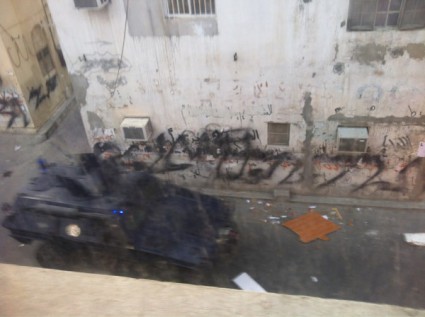
Report: Bahrain forces assault 16-year-old, activists say
21, March 2012 – blogR
A 16-year-old boy was reportedly beaten and sexually assaulted by security forces in Bahrain early this morning, activists report.
The picture of ‘Ali’, partly naked with marks of torture, has stirred up outrage amongst Bahraini activists on Twitter.
The teenage victim was reportedly kidnapped by security forces before being beaten and sexually assaulted and finally dumped in a farm in Sanabis, North West of Manama.
Said Yousif AlMuhafda, human rights defender, who met the victim says: “When I met him, he was unconscious and handcuffed, left in one of the garages in Sanabis without his underwear and bleeding”
‘Ali’ said he was attacked with a knife and punched several times, report Said Yousif AlMuhafda.
Said Yousif Al-Muhafda says the young boy was arrested before and stabbed by security forces as he refused to work undercover for them.
This terrible report comes as the King of Bahrain has expressed his satisfaction regarding progress made towards reforms especially regarding abuses committed by security forces.
March 21, 2012 No Comments
Rape and Assualt of Sanabis Villager as Human Rights Abusers move dark deeds into shadows
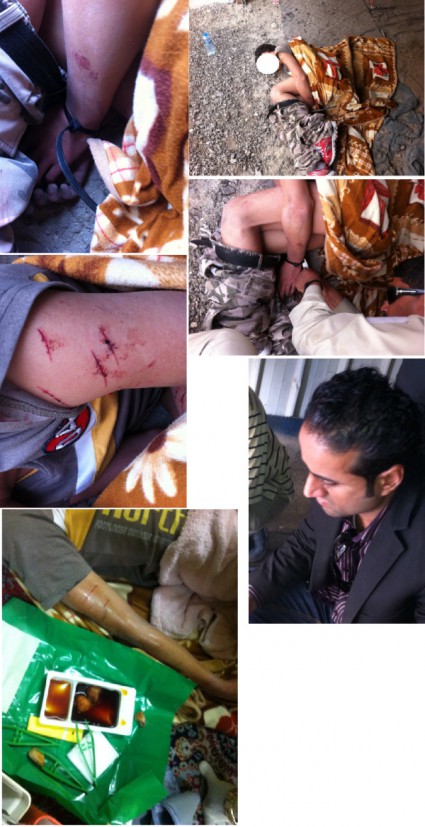 Human Rights Defender Said Yousif Almuhafda, bottom right, lends comfort to victim and documents crime scene.
Human Rights Defender Said Yousif Almuhafda, bottom right, lends comfort to victim and documents crime scene.
March 21, 2012 No Comments
Pressure Mounts on Human Rights Abuse in Bahrain, undergound acts of violence aimed at Shiites increase
Bahrain mosque damage shows plight to ease unrest
21 March, 2012 – By Brian Murphy – Associated Press – The Daily Star
MANAMA: At some point before dawn, the vandals struck with brutal efficiency, smashing the windows at one of Bahrain’s oldest Shiite mosques. Then the attackers walked over the broken shards to ransack offices and prayer areas – making sure to pull down some framed parchments with Quranic verses.
The attack last week, described by scholars and custodians of the centuries-old site, was quickly overshadowed by another wave of clashes in Bahrain’s 13-month-old uprising by the kingdom’s Shiite majority.
But even as the beleaguered Sunni monarchy claims progress toward reconciliation, the battered facade of the Sasa’a bin Sawhan mosque underscored the deep anger and suspicions that still feed the Arab Spring’s longest-running street battles – which show no signs of ending.
“I am horrified,” said Bahrain-based historian Jassim al-Abass following the March 13 attack on the site, which has connections to the earliest periods of Islam in the 7th century. “Instead of protecting mosques, officials are letting this happen.”
Bahrain’s Shiite mosques have been one of the most sensitive targets in the government’s crackdown on dissent and later attempts to make amends. Shiite clerics claim at least 38 mosques and affiliated sites, such as charity offices, were destroyed after the revolt began in February 2011. Bahrain’s Shiites – who account for about 70 percent of the population but allege they face widespread discrimination – rose up to demand a greater political voice. Some activists place the number of destroyed mosques at 55 or higher.
On Tuesday, a report given to Bahrain’s king, Hamad bin Isa Al Khalifa, reaffirmed plans to rebuild 12 Shiite mosques demolished last year by authorities. It’s unclear, however, what progress has been made on the sites.
…more
March 21, 2012 No Comments
Women in the Egyptian Revolution – The Herstory Project
Our Story
The participation of women in the Egyptian revolution didnt come as a surprise to us, nor do we view it as an extraordinary phenomenon.
Women are part of every society and form a part of the social, political and economical spectrum. It is history that tends in most cases to ostracize the participation of women and keep them in the shadow while highlighting the participation of men and attributing leading roles exclusively to them. This is why we want to document and share Her-story.
This project intends to shed the light on the participation of women and to document their experiences as part of the historical memory of the Egyptian revolution. It is also a tool for women empowerment everywhere and a source for researchers, students and everyone interested in the matter.
The investigation for the filming aspires to cover a variety of women from all spectrums of the Egyptian society and different regions in Egypt. The investigation will be continuous and work hand in hand with the filming crew. Our objective is to produce a minimum of two messages per week and make them available on the website as soon as they are done. So far the videos will be subtitled in English and Spanish, and we are working on covering other languages. …more
March 21, 2012 No Comments
British Minister Alastair Burt on Weapons to Bahrain: Britain is indeed “supplying things people might find uncomfortable”, “none of it is very nice”
editor: British Foreign Office Minister Alastair Burt and President Obama have reassured everyone that the weapons their countries supply to Middle East Tyrants are only being used to to defend borders and external threats. These are truly highly advanced smart weapons able to discern when they are being used “inappropriately” then apparently they “Switch-off”. It seems the only thing being “switched-off” is acknowledgement of the trail of blood from weapons sales to Human Rights abusers that stain the door steps and halls of Westminster and Washington. Phlipn
Minister defends Britain’s role in arms trade
21 March, 2012 – By Oliver Hotham – politic.co.uk
Britain plays a huge role in the international arms industry.
Foreign Office minister Alastair Burt has defended Britain’s role in the international arms trade.
In a hearing before the Commons’ foreign affairs committee examining the UK’s response to last year’s Arab Spring, Mr Burt argued the arms trade has value and is governed by strict rules which prevented Britain supplying Gulf states with tools for repression.
He denied allegations that British-supplied arms had been used by the government of Bahrain to suppress protests in last year’s Arab Spring, saying the weapons supplied had been for border control.
The responsibility for overseeing such transactions lay with the foreign affairs committee, he said, in a heated exchange with committee member Ann Clwyd during the hearing.
However the minister accepted that, with regards to the arms Britain supplies Gulf states, “none of it is very nice” and that Britain was indeed involved in “supplying things people might find uncomfortable”.
Britain cannot rule out “difficult trade”, he added.
The Foreign Office minister also denied claims that British ally Saudi Arabia had been involved with repression in Bahrain.
Last year’s protests in Bahrain saw the government use deadly force against peaceful protesters, with 84 dead and thousands wounded. It has been alleged that arms used by the government were supplied by British arms dealers.
Britain is the world’s fifth largest exporter of arms and British company BAE Systems is one of the world’s largest arms developers.
March 21, 2012 No Comments
Desperate for the F1 as Bahrain’s Economy Tanks
Bahrain economy slows to 1.3% growth
By Reuters – 21 March, 2012
Bahrain’s economic growth slowed in the final three months of 2011, a sign that political unrest is continuing to weigh on businesses after an uprising against the government was crushed early last year.
Inflation-adjusted expansion in gross domestic product deccelerated to 1.3 percent quarter-on-quarter from 2.2 percent in the third quarter of 2011, the statistics office said on Wednesday. On an annual basis, GDP expanded 3.2 percent in the fourth quarter after a 2.9 percent rise in July-September.
Overall, economic growth in the small non-OPEC oil exporter roughly halved to 2.2 percent last year, the worst performance since a 0.3 percent contraction in 1994, when oil prices fell to US$13 per barrel. They are currently above US$120.
“Given the high oil prices last year, for an oil producer a 2 percent growth is not particularly impressive,” said Gabriel Sterne, a senior economist at Exotix in London.
Click here to find out more!
“That is mainly due to the political tensions that we have seen. Nothing was really resolved to the satisfaction of all parties.”
The Sunni-controlled island kingdom, a Gulf financial hub, was hit hard in February and March by its worst sectarian unrest since the 1990s, which forced banks and shops to close and triggered an outflow of funds. Total investment parked in Bahrain’s mutual funds dropped by nearly US$800m last year to US$8.4bn, central bank data show.
Last year’s economic growth “is satisfactory in light of current economic challenges and the economic outlook in the near term looks positive”, Central Informatics Organisation president Mohammed al-Amer said as he announced the GDP data.
“Improving local and global indicators are also expected to result in economic stability (and) encourage local and foreign investors to reconsider shelved investment decisions. However, restoration of economic growth rates which were prevalent before the crisis will take some time,” he said.
Output growth in the hydrocarbon sector, which accounts for a third of Bahrain’s $26 billion economy, more than halved to 2.4 percent quarter-on-quarter during October-December, the data showed. …more
March 21, 2012 No Comments

